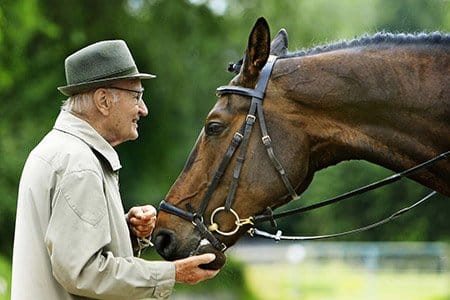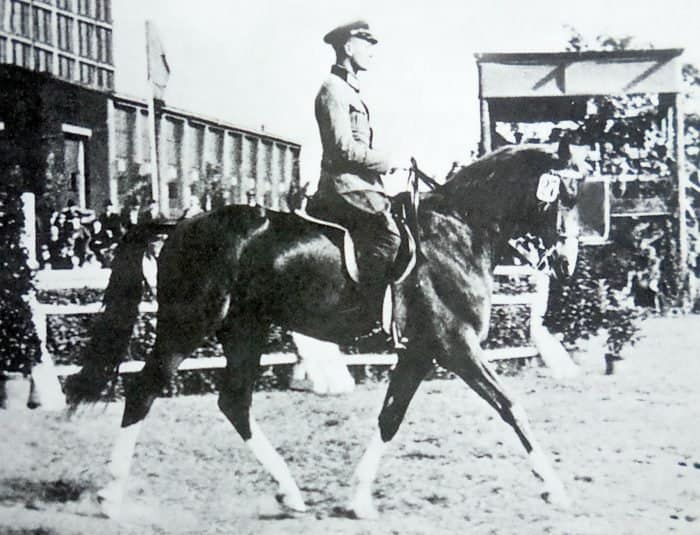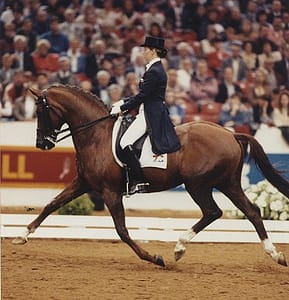
Paul Stecken ©Jacques Toffi
Paul Stecken: a century dedicated to the welfare of horses
Paul Stecken is an iconic figure in the equestrian world, whose life and career are steeped in passion, dedication and a deep understanding of the relationship between horse and rider. Born in Münster, Germany, on June 29, 1916, Stecken dedicated his life to the promotion of classical horsemanship and the welfare of horses, becoming a landmark in this world.
The Roots of a Great Teacher
From an early age, Paul Stecken grew up in an environment where riding was academic and military. His father, Heinrich Stecken, directed the Westphalian Riding School in Münster for 24 years, from 1926 to 1950, and was also its first teacher. This paternal influence instilled in Paul a deep love of horses and helped shape his equine training skills and philosophy.
At the age of 18, Paul enlisted in the German army, where he joined cavalry regiment number 15 at Schloss Neuhaus, Westphalia. There, under the guidance of great teachers such as Edwin, Count of Rothkirch, and Captain Lippert, an Olympic gold medalist, he further honed his skills. These teachings had a lasting impact on his career, turning him into an expert in dressage and show jumping.

The management of the Westphalia riding school.
At the age of 34, in 1950, after World War II had severely damaged his father’s Westphalia Riding School, Paul Stecken took over its direction, carrying on an equestrian tradition rooted in decades of history. For 35 years he worked steadily to restore and improve the school, putting the respect and welfare of the horses at the forefront.
Stecken was one of the last witnesses to the transition of equestrianism from the prewar to the postwar period.
Philosophy of teaching
Above the entrance to the stable was visible Stecken’s motto: “One learns to ride only by riding.” However, apprentices had ironically transformed it into: “One learns to ride only by sweeping.” This pun perfectly reflected the atmosphere of the stable in those years, a place where order and diligence were basic rules.
When Stecken crossed the threshold of the stable, a respectful silence fell over everyone. Students would line up, their faces solemnly committed to appropriate behavior. The cleanliness of the stables was sacred: every time a horse passed by, the floors were supposed to shine like mirrors, silent witnesses to the effort expended.
Stecken did not try to intimidate; on the contrary, his natural charisma instilled respect and admiration. His every sentence was a lesson: “The more time you give the horses at the beginning, the more you save later.” These words rang in his students’ ears, reminding them of the patience needed to establish a lasting relationship with their horses.
With the young colts, rope and saddle work followed well-defined rhythms, respecting the horses’ needs. Stecken and his students knew that a proper initial warm-up fostered not only better performance, but also a deep bond between horse and rider.
In that reality, the right conditions were created, and the time devoted to learning and patience was rewarded with gratitude and results from the horses themselves.
“Riding correctly is enough”
His best-known motto was: “Riding correctly is enough.” Paul Stecken helped train numerous students, passing on his philosophy and proven riding methods. His importance is not limited only to technique; Stecken also had a significant impact on the mindset of athletes. He taught that the path to success in riding is as personal as it is physical, encouraging riders to cultivate a mindset of patience and dedication. This ideal shaped and organized an entire generation of riders, who continue to carry on his knowledge about classical horsemanship.
Dressage in the 21st century
In the equestrian world, the figure of Paul Stecken emerges as a beacon of integrity and wisdom. Since the late 20th century, when training techniques such as the Rollkur and hyperflexion began to dominate the dressage landscape, Stecken has been one of the few internationally renowned experts to openly and severely criticize these practices, which were deemed detrimental to the health and welfare of horses.
Paul Stecken and his opinion against Roolkur
Rollkur, a controversial method of training, involves a forced position of the horse’s neck, which is lowered and pulled downward. This approach gained notoriety in the 2000s and has raised concerns among many experts. Hyperflexion is intended to achieve flashy movements but often at the expense of animal welfare. Paul Stecken has continually pointed out how these techniques can do physical and psychological harm to horses, making performance more coercive than natural.
During the 2009 European Dressage Championships in Windsor, the use of Rollkur was observed, especially in the case of Totilas, a horse that had captured the attention of the public and fans. However, Stecken did not shy away from highlighting the problems associated with training this equine. He observed how Totilas presented an unnaturally short neck and overly elaborate movements. His words rang loud and clear: “This attitude is incompatible with the health and welfare of the horse.”
Stecken’s Vision of Equine Welfare.
For Stecken, the primary goal in training should never be just to impress the public or to achieve high scores in competitions. The horse’s welfare must come first. Coercion in neck posture and forced muscle tension can lead to a stiff and immobile physical condition, compromising not only performance but also the horse’s quality of life. His remarks invite us to reflect on what it really means to ‘compete’ in dressage: is it possible to do so without compromising the animal’s physical and mental health?
A farewell to a great horse man
Stecken was a renowned trainer, judge and rider who devoted nearly a century to promoting and teaching traditional equestrian techniques. He has been the mentor by such notables as Olympian Reiner Klimke and his daughter Ingrid.
Ingrid was asked how she would describe Stecken: “I would describe him this way: he is a gentleman. He is attentive, he can listen, he analyzes everything very carefully, he is cautious. His special gift: he can explain correlations extremely effectively. At the same time, he has clear principles to which he adheres, and nothing in the world can convince him otherwise. No one else has such a long and rich background as Mr. Stecken. I admire and respect him greatly. He is honest, intelligent and rock solid.” (quot. chioaachen.de)
This comment allows us to learn about an aspect of his personality, not limiting us to seeing him only as an expert in the horse world, but also revealing his character and human nuances.
At the age of 100, Paul Stecken passed away on September 15, 2016, leaving us with a very important legacy.
Share the article on your favorite social network
You may also be interested in : Reiner Klimke: his contribution to future generations
Subscribe to the newsletter to receive new articles from the Blog

